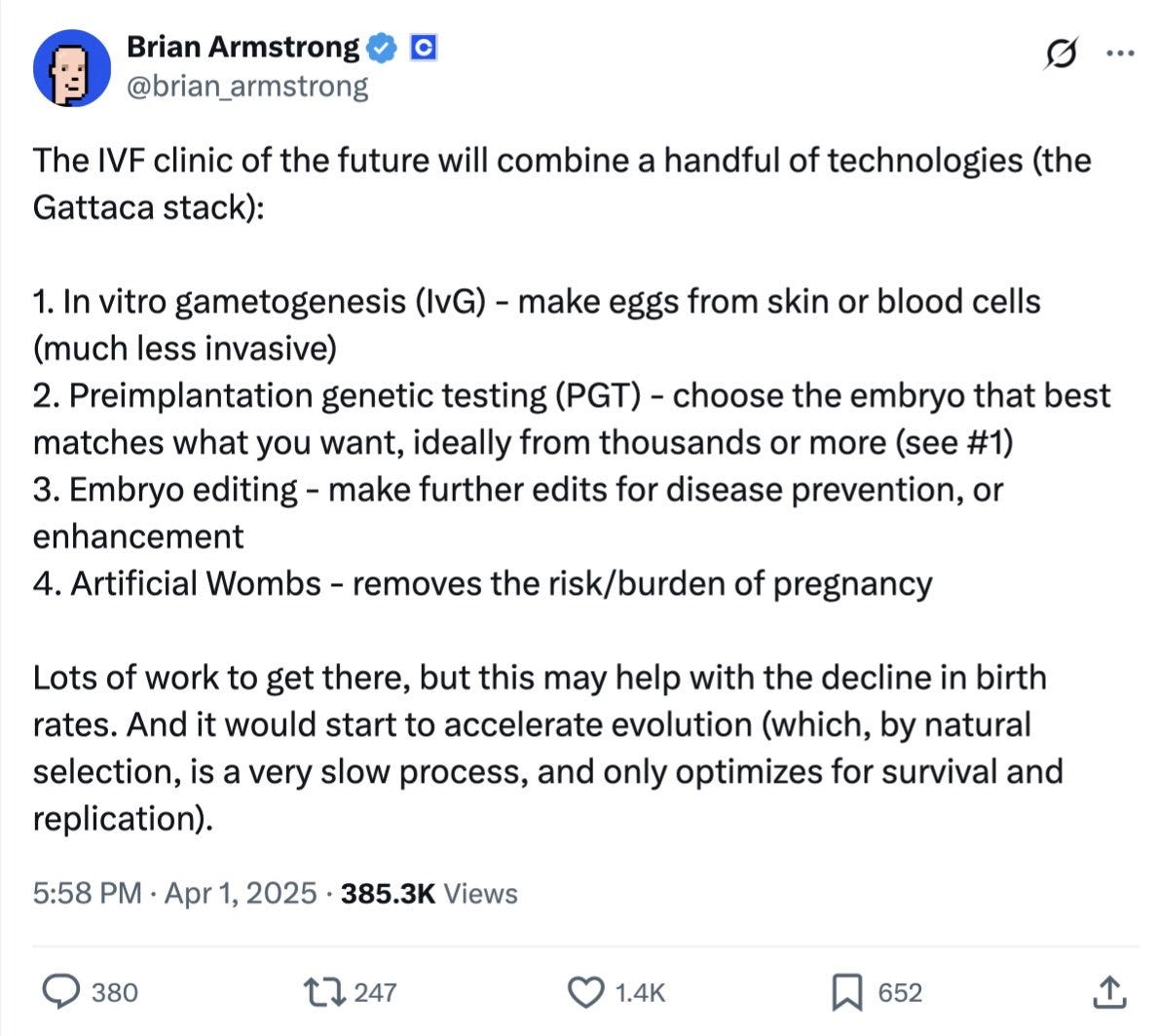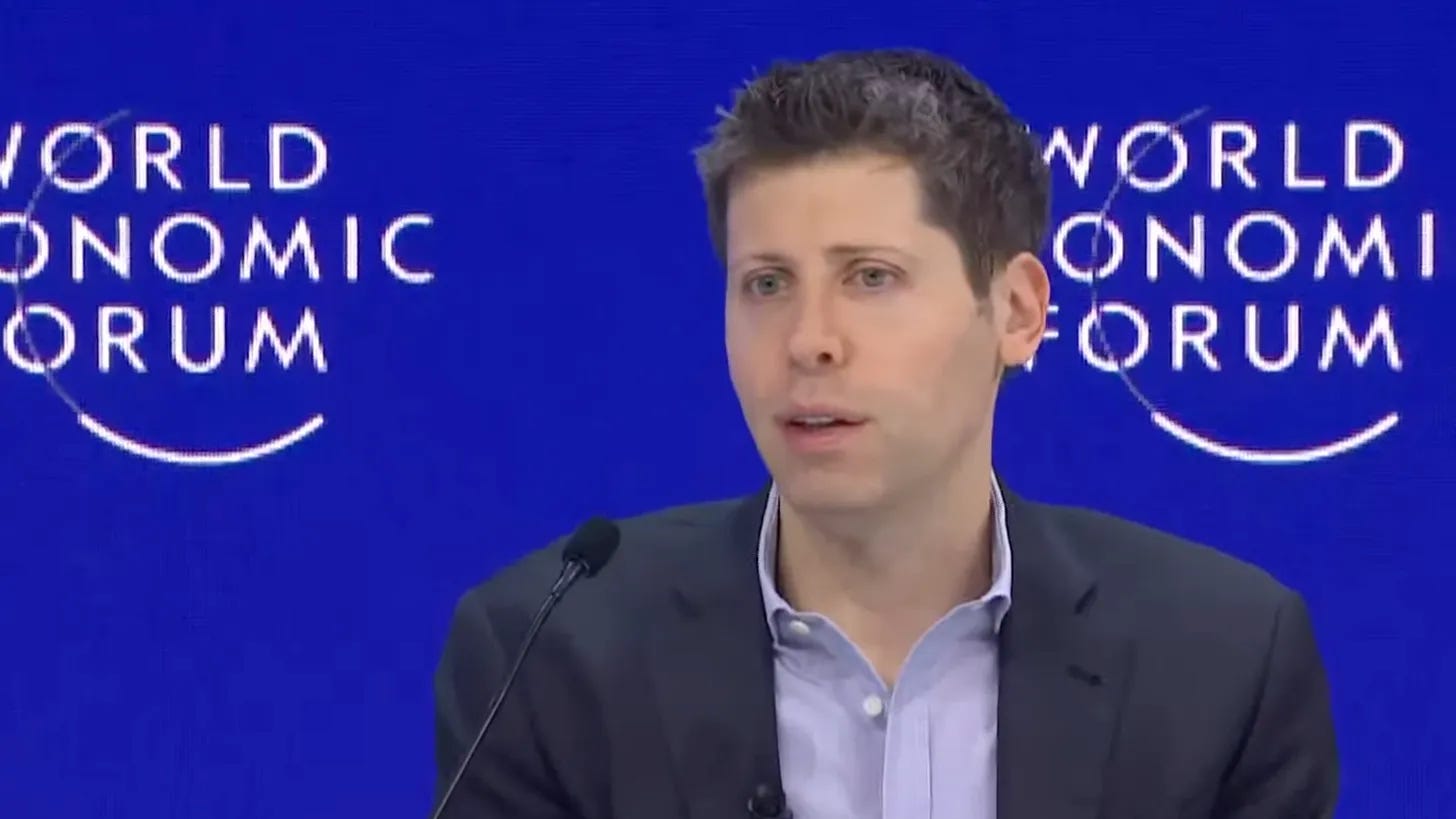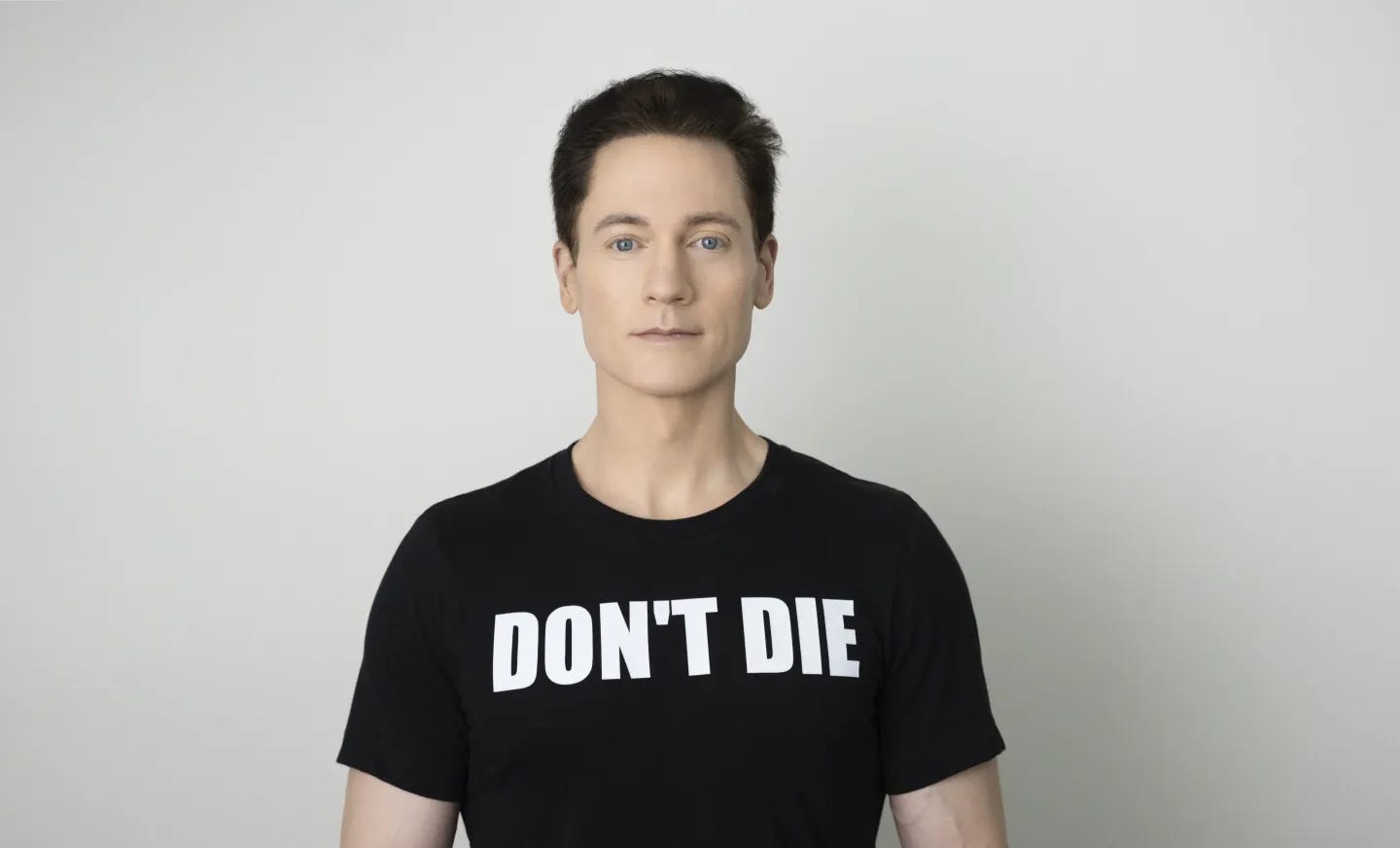Against Techno Optimism
Technology can help advance human flourishing, but it is not an all-encompassing "solution" to the imperfections in society.
I recently stumbled upon a genuinely dystopian X post by Coinbase founder and CEO Brian Johnson, a billionaire entrepreneur and a high-profile member of the “techno-optimist” movement.
Now, I don’t bring this to your attention as some rejection of IVF, but in particular, a focus on his third and fourth points, which expresses a core element of techno-optimism: the striving towards replacing God himself with technology.
Please check out The Dossier’s curated advertisers. It helps support our work!
The team at 1440 scours over 100+ sources ranging from culture and science to sports and politics to create one email that gets you all caught up on the day’s events in 5 minutes.
Sign up for 1440, it's 100% free
Armstrong is one of many high-profile members of a burgeoning group of techno-optimists with increasing political and financial power in Washington and on Wall Street. Interestingly enough, while their political loyalties have been all over the place in recent years, techno-optimists largely voted Republican in the 2024 elections, rightly assessing that President Trump would be more beneficial to the business climate than former Vice President Kamala Harris.
Techno-optimism is the political right’s anti-humans. Similar to the anti-human climate hoaxers on the left, techno-optimists believe that humanity is inherently flawed and that our imperfections can only be “fixed” by a technologist class of high-profile founders and executives, which ultimately seeks to remove our humanity on a pipeline to becoming cyborgs.
Techno-optimism is a global movement that enjoys popularity in several distinct regions, communities, and cultural contexts around the world. It is often tied to hubs of technological innovation coupled with hyper-secular godless societies. Unsurprisingly, Silicon Valley, which remains the world's tech mecca, stands as its epicenter. Its appeal thrives where there’s a blend and bubble of cutting-edge research and development, entrepreneurial firebrands, a complete and total rejection of Western traditionalism, and a cultural openness to transforming humanity root and branch.
You don’t need an advanced degree in psychoanalysis to discover that techno-optimists often have giant voids and/or irregularities in their personal lives, which they seek to “solve” through technological means. They advance a near-religious belief in technology’s ability to solve not just their personal problems but global (and even multi-planetary) problems, even if that means transforming humanity into a utopian (dystopian) cyborg metaverse where everyone lives in a cube, humans become semi-invincible, and we live in harmony in a world without conflict. They operate within an ideology that promotes Gattaca, The Matrix, and Terminator as a utopia, not a dystopia.
Armstrong and his cohorts amplify this ethos with the new push of AI-driven futures. In the AI era, America’s robust venture capital ecosystem and startup culture fuel techno-optimism, attracting dreamers who see AI — not religion or tradition — as humanity’s ultimate salvation. It’s a self-reinforcing bubble where wealth, talent, likemindedness, and ambition fuse. And like their counterparts on the anti-human left, they view dissidents to techno-optimism as primitive throwbacks that don’t understand the urgency of their maniacal fantasies.
Techno-optimism, the fervent belief that technology will replace God and usher in a utopian future, carries an obviously dark undertone with those who hold traditional values.
The new “big tent” on the right pairs believers who lead humble, moral lives with godless visionaries who are driven by a secular zeal to transcend human limitations and remake humanity into part flesh, part machine cyborgs. You can see the clash coming from a mile away.
At its core, techno-optimism abandons the divinity, the imperfect, and the sacred. They substitute faith with a cold, mechanistic worldview, worshipping innovation as a new deity.
You don’t need to be a luddite to be alarmed by the rise of techno-optimism. Many Americans rightly accept technology as a great tool to improve humanity and technological advancement as a means to solve our most challenging problems. But technology is NOT a replacement mechanism for humanity itself.
Despite some techno-optimists facilitating incredible contributions to our lives, this undertone of Godless hubris, a desire to play creator by rewriting the human condition, will surely catch up to them.
The techno-optimist agenda serves as a slippery slope toward dehumanization. The push for integration between humanity, AI, and machines may very well lead to happier and healthier humans, though it will not ultimately fulfill the techno-optimists’ search for purpose in this world. No amount of technological progress can override our human condition. From a policy perspective, it’s worth considering what guardrails we can put in place to keep the techno-optimist agenda in check.
The techno-optimist class has an alarming obsession with control. They reject life’s mysteries and imperfections and must “solve” for them, leading many to rightly point out that they are teetering with eugenics. Techno-optimists see disease, aging, and even death as problems to be solved, not accepted. This rejection of natural limits displays a godless arrogance. The cyborg dream isn’t just physical but existential. It’s a refusal to be human, with all its fragility and wonder.
Techno-optimism’s flaw isn’t just practical but philosophical. Its proponents are fixated on turning us all into “perfect” beings, and they seek to erode the unquantifiable things that make us human. The advocates for a hollowed-out existence are nothing more than anti-humans with a different cause. Our imperfections are what make us uniquely human. Our struggles, our triumphs, and our belief in a higher power are what give us purpose. Technology is a tool that can be used to accomplish incredible feats, but it is not the whole of our existence.
I am against techno-optimism, and you should be, too.







I had pretty much the same reaction when I heard JD Vance’s speech “Techno optimism vs. populism” and when Project Stargate was announced. I worry about Vance and his relationship to Peter Thiel in all this rhetoric. You hit the nail on the head with this. Nice take!
Tech is nice until it becomes a tool of the wretched abusers who hate humans.